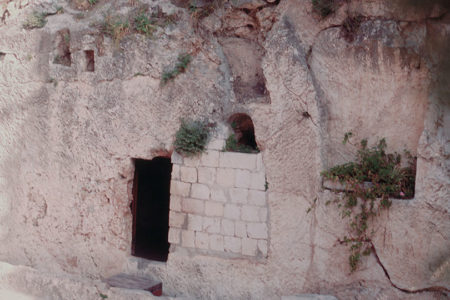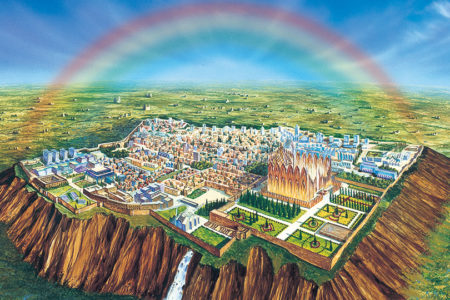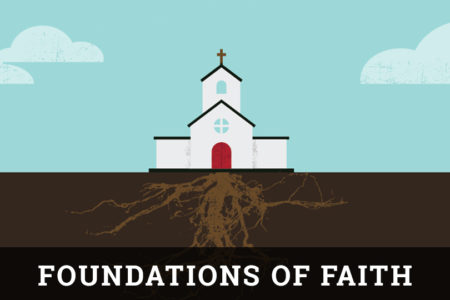Israel’s Right to Peace And Security
It is increasingly clear that the major roadblock to peace between Israel and the Palestinians is not Israel’s alleged refusal to make concessions to Arab demands. In fact, the more land Israel concedes, the more strident the Palestinian cry becomes for more.
In the wake of the Israeli troop withdrawal from Hebron—a place where 450 Jews live in the midst of 130,000 Palestinians—Jewish residents live in a virtual state of siege. Their Arab neighbors do not regard the “peace” as a reason to allow Jews their basic right to some degree of tranquillity for themselves and their families. The pressure for all Jews to be expelled is constant.
Bethlehemites have also had their share of problems since the town of Jesus’ birth was handed over to Yasser Arafat and the Palestinians. Many Arab Christians have felt obliged to flee or face the wrath of radical Islamic elements. The population shift in Bethlehem has been dramatic. Once the ratio was 80% Christian to 20% Muslim. Today, the numbers have reversed—20% Christian to 80% Muslim.
That Arafat has not negotiated in good faith is now an on-the-ground reality that can no longer be written off by his apologists as an exhibition of Arab rage.
When the bottom line is drawn, we come to an inescapable conclusion: The current leadership of the PLO and the vast majority of Islamic leaders want Israel out of the land that they claim as the sole property of the followers of Allah. This motivation, which is poorly understood in the Western world, is a cardinal element in the ongoing claim by Arafat and radical Muslim leaders that the ultimate objective must be to win all of Palestine for Islam. For them, this is a crusade—one bent on seeing, as their maps currently indicate, a Palestine with no Israel and devoid of Jews. Make no mistake about it, for Islamic radicals this is a war of religions, pitting Islam against the infidels in Israel, the United States, and the Western nations.
If religion is a factor carrying some degree of prominence in the current controversies afflicting the peace process, it is important to understand what the Bible has to say on the issue. This is not a frivolous matter better left to religious philosophers and theorists. It is substantive and must be brought into the discussion regarding Jewish land rights in the Middle East. Be assured that this is of no small consequence with Islamic people in their laying claim to the region. Indeed, the rationale for creating tyrannical Islamic regimes—such as Iran and Sudan—are based upon an interpretation of the Koran that endorses Jihad (holy war) as an instrument for creating an Islamic world.
Today, Arafat and other Islamic leaders say that Israel has no legitimate claim to their ancient attachment to the region. They have even gone so far as to attempt to certify the preposterous idea that ancient Jews did not have a presence on the Temple Mount in Jerusalem. But, in spite of such exercises in exciting the historically illiterate, archaeology and an abundance of documentation confirm Jewry’s historic, moral, and legal rights in the land of Israel. The major authoritative source authenticating Jewish relationships and rights in the Middle East comes to us from the pages of the Bible, wherein covenants, grants, and promises for the future were made that are to be regarded as irrevocable. Several factors are basic to understanding God’s relationship to the Jewish people and their association to the land of Israel.
Identifying Israel
Conflict between Muslims and Jews often arises over the identification of just who the Chosen People are: the rightful heirs to the covenant promises delineated in Scripture.
And God said, Sarah, thy wife, shall bear thee a son indeed; and thou shalt call his name Isaac: and I will establish my covenant with him for an everlasting covenant, and with his seed after him. And as for Ishmael, I have heard thee: behold, I have blessed him, and will make him fruitful, and will multiply him exceedingly; twelve princes shall he beget, and I will make him a great nation. But my covenant will I establish with Isaac, whom Sarah shall bear unto thee at this set time in the next year (Gen. 17:19–21).
Here God is speaking to Abraham regarding the future of his sons, Isaac and Ishmael. Arabs trace their lineage back to Ishmael, the Jewish people to Isaac. Notice that the covenant promise was bestowed to Isaac and his heirs, not to Ishmael. This is important, but it is not in any sense—as is sometimes stated—an act of discrimination. Ishmael was given sweeping promises, great lands, and the assurance of kingdoms. A look at a map of the Middle East today confirms that the land mass controlled by Arab and Muslim countries far exceeds that held by Israel.
The Promised Land
When God promised a land to Abraham, Isaac, Jacob, and their posterity, the grant was given unconditionally. Whether the Jewish people were in the land or suffering through the many expulsions endured by the nation, the land now commonly referred to as Palestine was and is the land of the Jews.
“In the same day the Lᴏʀᴅ made a covenant with Abram, saying, Unto thy seed have I given this land, from the [little] river of Egypt unto the great river, the river Euphrates” (Gen. 15:18).
An important element in establishing the possession of the land by ancient Israel is Jerusalem. After David had ruled from Hebron for seven and a half years, he moved the capital city of the Jewish state to Jerusalem. A key factor in the move was his purchase of the Temple Mount from one Araunah, the Jebusite. Incidentally, Israel and the Jewish people have never since offered that sacred site for sale. Although it is claimed by the Muslims today, it must still be regarded as an area titled to Israel from a time well before Islam came into existence.
Preservation of the Jewish Nation
It is one thing to lay claim to a land on behalf of an ancient nation. It is quite another for that nation to be on the scene thousands of years later to implement the transaction. In the case of the Jews, this is one of the most enigmatic of historical occurrences. How could a people, with minuscule numbers of descendants, survive after being the subject of a virtually unbroken succession of attempts to wipe them from the face of the earth? Expulsions, pogroms, inquisition, and the infamous Holocaust inundated Jewish people in their own blood time and time again. Adolf Hitler was not alone in announcing “a final solution to the Jewish problem.” In spite of this, Israel has survived. Scattered among the nations as they were, the fact that they were not wiped out or assimilated—as were most of their ancient contemporaries—is in itself the singular mystery of history. How could it have happened? While the issues of survival for the Jews are indeed complex, the source of their preservation can be simply explained. Anticipating all that would befall the Jewish people across the millennia, the Bible makes a prediction that only God Himself would be qualified to articulate.
Thus saith the Lᴏʀᴅ, who giveth the sun for a light by day, and the ordinances of the moon and of the stars for a light by night, who divideth the sea when its waves roar; The Lᴏʀᴅ of hosts is his name: If those ordinances depart from before me, saith the Lᴏʀᴅ, then the seed of Israel also shall cease from being a nation before me forever. Thus saith the Lᴏʀᴅ, If heaven above can be measured, and the foundations of the earth searched out beneath, I will also cast off all the seed of Israel for all that they have done, saith the Lᴏʀᴅ (Jer. 31:35–37).
It would do us well to remember that this statement is an against-all-odds declaration. God alone could be deemed competent to cause it to come to pass.
The Return to Eretz Israel
For two thousand years, around every Jewish Passover table the world over, Jewish people have intoned the solemn words, “Next year in Jerusalem.” Few ever believed it could happen—but it did. And I suppose, in a very real sense, we who have lived to witness it can say, in truth, “We have seen a miracle.” Biblically, it was never in doubt.
That then the Lᴏʀᴅ thy God will turn thy captivity, and have compassion upon thee, and will return and gather thee from all the nations where the Lᴏʀᴅ thy God hath scattered thee…And the Lᴏʀᴅ thy God will bring thee into the land which thy fathers possessed, and thou shalt possess it; and he will do thee good, and multiply thee above thy fathers (Dt. 30:3, 5).
The undeniable fact we live with every day is that Israel is, after all of these centuries, back home—just as the Bible said it would be.
A Future Day of Restoration
There is a final fact that cannot be discounted. As emphatically as the Bible has outlined Israel’s ancient past and present situation, it has sketched the future. All that is developing around us is moving toward a consummation. For those of us who wrestle from day to day with questions like how to deal with the likes of Iran or Saddam Hussein, there is hope on the horizon. The same Bible that has pronounced and then performed acts far beyond our capacity to create or circumvent has made another declaration. And once again, Israel is the key.
And they shall be my people, and I will be their God; And I will give them one heart, and one way, that they may fear me forever, for the good of them, and of their children after them…Yea, I will rejoice over them in doing them good, and I will plant them in this land assuredly with my whole heart and with my whole soul (Jer. 32:38–39, 41).
This is the phase referred to in the New Testament as the “all Israel shall be saved” statement of Romans 11:26. Yes, there is a national day of reconciliation prophesied for Israel, but that will also be an era when “the Lord shall be king over all the earth; in that day shall there be one Lord, and his name one” (Zech. 14:9).
In all of this, there are some things we would do well to keep in mind. First, the Scriptures quoted above represent only a sprinkling of texts on these subjects. The Bible is weighted down with statements regarding the future of Israel and the Jewish people.
Second, we must not neglect—for it would be at our peril—a word from Scripture that has been scrupulously observed by many Western nations, especially the United States of America.
And I will make of thee [Abraham] a great nation, and I will bless thee, and make thy name great; and thou shalt be a blessing. And I will bless them that bless thee, and curse him that curseth thee: and in thee shall all families of the earth be blessed (Gen. 12:2–3).
We, as Americans, can all attest to and be thankful for this divinely bestowed legacy.







